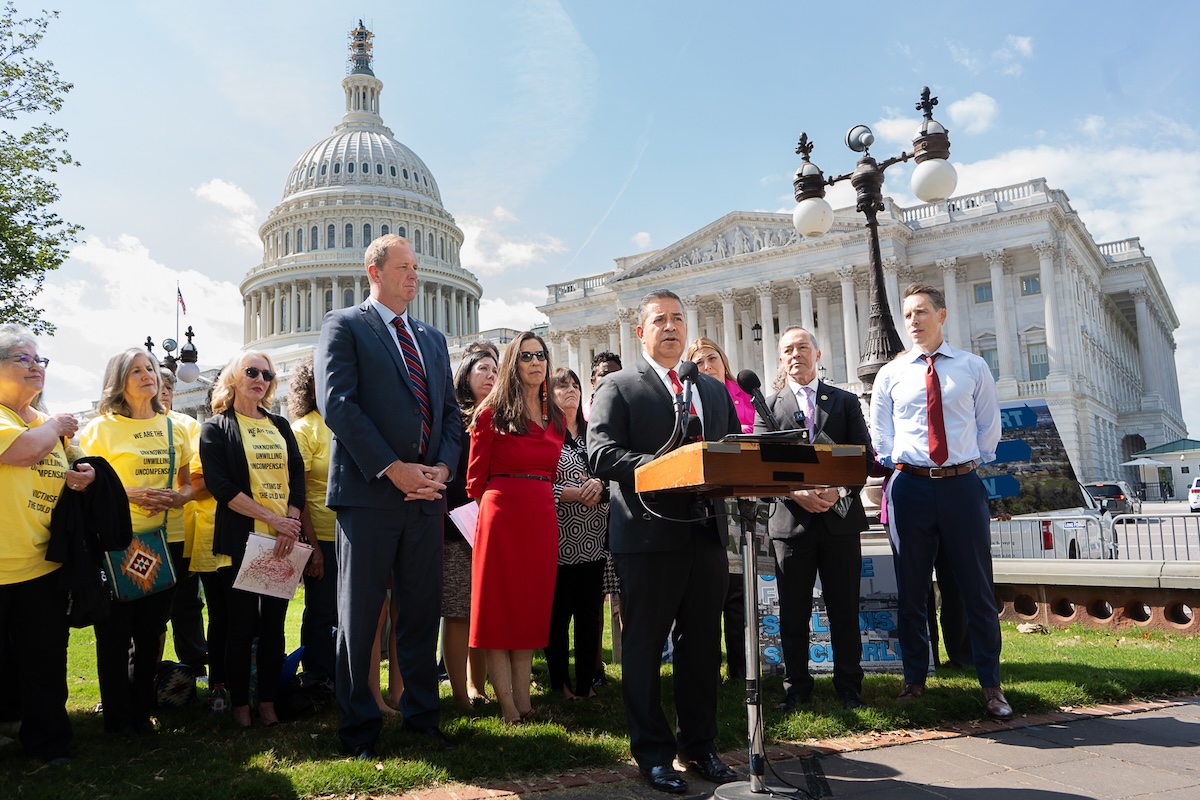Indigenous advocates who have been impacted by radiation exposure are ramping up the pressure they’re putting on U.S. Speaker of the House Mike Johnson to allow a vote on legislation that will help radiation survivors pay for health care related expenses.
These advocates, including the Sawmill Diné Warriors, Southwest Uranium Miners Coalition Post-71 and Navajo Uranium Victims Committee, are raising money to travel to Washington D.C. to protest Johnson’s refusal to bring expansion of the Radiation Exposure Compensation Act to the floor for a vote. The legislation passed in the U.S. Senate earlier this year on a bipartisan vote.
The advocates started a GoFundMe, whichhad raised more than $11,000 as of Thursday.
The goal is to bring in at least $30,000, which will allow them to book a bus and pay for food and water. If the group exceeds its goal, the money would go towards hotel rooms for the radiation exposure survivors who are making the trip. The advocates also hope to be able to pay for advertisements to run in the D.C. area while the survivors are there.
Every Thursday, get the latest environment news from New Mexico in your email. Sign up here!
The original RECA legislation expired this year and had excluded New Mexico downwinders as well as people who worked in uranium mining and milling after 1971.
Loretta Anderson, a member of Laguna Pueblo, and Maggie Billiman from Sawmill, Arizona, are among the activists.
Billiman’s community was impacted by the nuclear weapons testing in Nevada. Up until this year, Sawmill residents were able to submit claims if they became sick with a disease associated with radiation exposure. But, since RECA expired, no more claims are being accepted.
Billiman’s father was among those who died of cancer due to the fallout from nuclear weapons testing. The Navajo Code Talker passed away in 2001 after being diagnosed with stage 4 stomach cancer.
Billiman said they are going to D.C. “to try to let Johnson hear our voices.”
She said the communities impacted by radiation exposure are suffering.
Like Billiman, Anderson has lost family members to radiation exposure. Her community is near the Jackpile-Paguate Uranium Mine site. Anderson founded the group Southwest Uranium Miners’ Coalition Post ‘71.
Both of Anderson’s parents worked in the mines and were later diagnosed with pulmonary fibrosis, which occurs when the tissues in the lungs are scarred and damaged. Her father passed away in 2020 from cancer and her mother died two years later.
Both Anderson and Billiman have been telling their stories for years and advocating for expanding compensation. They say they haven’t been heard.
“Mike Johnson has not listened to our voices, our testimonies,” Anderson said. “He has totally just ignored us. He says that we are not a priority. So as Indigenous people, the Navajo Nation, Laguna, Acoma, the Hopi reservations, we’re all going united. We’re going to stand together and make noise, we’re going to lobby, we’re going to pray.”
She said that they will do a three-day sitdown at the U.S. Capitol building and across from the U.S. House of Representatives.
“(Johnson) needs to know that our people are sick, suffering and dying,” Anderson said.
The advocates previously protested when Johnson visited New Mexico to campaign for former U.S. Rep. Yvette Herrell, who is running as a Republican to retake New Mexico’s 2nd Congressional District seat.
Anderson said Johnson did not even look at them as his car drove by.
She said RECA should be a bipartisan issue.
“It’s not about the Democrats or the Republicans, it’s about all people. And he’s even walking away from his own people, the Republicans,” she said.
Anderson said that it’s also about people who served the United States, including those in the armed forces.
The activists are upset that Johnson has expressed concerns about the price tag associated with RECA expansion.
Anderson said that Congress can send billions of dollars to other countries but is unwilling to pay to compensate the people who got sick because of government actions.

